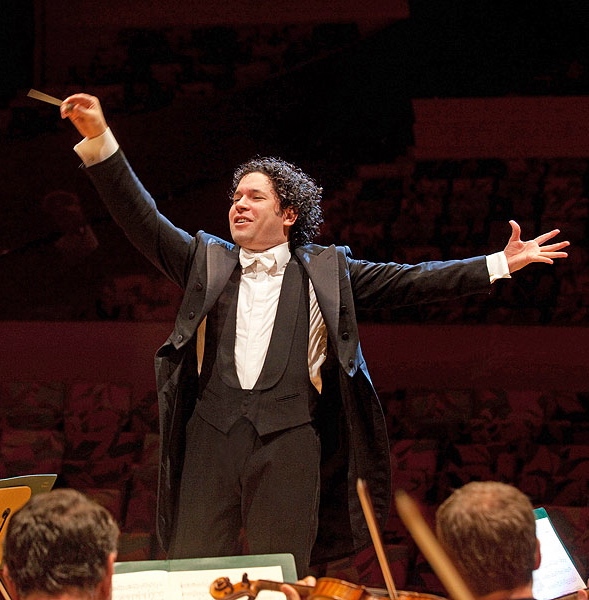Dudamel and Bolivar Symphony rock the house with Latin music and Stravinsky

Gustavo Dudamel conducted the Simon Bolivar Symphony Orchestra Friday night at Carnegie Hall.
For the second night in a row, the Simón Bolivar Symphony Orchestra of Venezuela held court at Carnegie Hall. And for the second night in a row, they earned a warm reception, offering a major Stravinsky work and a selection of treats from Venezuela and Brazil. Once the youth orchestra at the apex of El Sistema, Venezuela’s celebrated program of national music education, the Simón Bolivar Symphony has come of age, growing into a formidable ensemble.
Their music director, Gustavo Dudamel, is one of a handful of young conductors who have achieved rock-star status, receiving loud cheers long before even reaching the podium. He comes by it honestly–he is an exciting performer to watch, but more importantly an exciting and imaginative interpreter.
Reversing the announced order of the program, they began with two selections from Juan Carlos Núñez’s Tonadas de Simón Diaz (1999). The orchestra showed an impressive display of color in “Mi querencia,” with bristling, brawny strings at the start contrasting sharply with piercing woodwinds, before giving way to excited general motion. “Tonada del Cabestero” was of a different but similarly invigorating character, maintaining a constant, bounding energy.
Dudamel excels at creating excitement by tapping the raw energy of his orchestra, goading all sections to play with abandon. The tradeoff, often, is his tendency to lose detail–complementary ensemble, which should cause sections to balance and contrast to each other, tended to get lost in the general commotion. Dudamel’s is an effective approach, if imprecise.
Paul Desenne’s Hipnosis Mariposa (2014) begins with a dark, muddy, rocking stasis that slowly clarifies. Desenne varies his colors, but a feeling of tightness lingers for much of the opening section, as of creeping vines or a thick fog. His pictorial sense is strong–we hear birds, and not pretty ones, represented by high pecking on the violins, so intricately patterned as to sound almost arrhythmic until resolving beautifully into a dance for the entire orchestra.
Moving from Venezuela to Brazil, the program continued with Heitor Villa-Lobos’s Bachianas brasileiras No. 2. “O canto do capadocio” (“The Scamp’s Song”) begins with a seductive saxophone solo, lounging smoothly on the very lightest bed of orchestration. “O canto da nossa terra” (“The Song of Our Land”) felt large in the most general kind of way, but evolved into a strong and pulsing dance.
Shaky ensemble marred the start of “Lembrança do sertão” (“Remembrance of the Bush”), but the running, blurring motion of the strings that followed was smartly executed. Lightest of the four, but the most evocative in its way, was “O trenzinho do caipira” (“The Peasant’s Little Train”), a charming vignette made largely of clever sound effects, and Dudamel was not shy about playing up its brash appeal–cellos lurching the engine forward, winds and a brushed cymbal letting out the steam, violins clattering along the rails. The trick admittedly gets a little tired after a while, slowing down again without having gone especially far. One wonders what a stray calf, wandering onto the track, might sound like.
Though more substantial, Stravinsky’s Pétrouchka was a perfect complement for these playful selections. Dudamel channeled a quirky spirit in the sprightly opening fanfare of the Introduction, followed by more brilliant energy in the rushing depiction of “The Crowds.”
Strong characters stood out throughout this reading–Pétrouchka’s weary despair, the menace of the Moor, the coquettish grace of the Ballerina. Dudamel masterfully depicted the romance of the latter two in an adorably tipsy little waltz. The bears especially, plodding through their dance in the deep groans of the basses, were perfectly depicted.
Throughout Friday’s performance, the Bolivar strings seemed lacking in definition–Dudamel has little trouble achieving volume, but mass was something that seemed to escape him, unable to bring real weight of tone to enliven his vision. The closest they came was in the Dance of the Wet Nurses, where the spacious string melody soared grandly over the excited bustle of the brass.
An encore of the Berceuse and Finale from Stravinsky’s Firebird started with an iffy tremolo, but the gorgeous horn solo layered on top more than made up for it. As the peals of brass fanned out, Dudamel was unafraid to let the piece be the massive, joyous celebration that it is, calling for ever more volume from every section of the orchestra.
Another, longer ovation ensued, and Dudamel finally let his arm be twisted into a second encore–a zesty, playful rendition of Pedro Guttierez’s “Alma Llanera.” As one percussionist worked his way to the front of the stage to perform a maraca solo, one could only pity the poor usher who had the thankless task of patrolling the aisle to scold the scores of listeners who had pulled out their phones to grab a video.